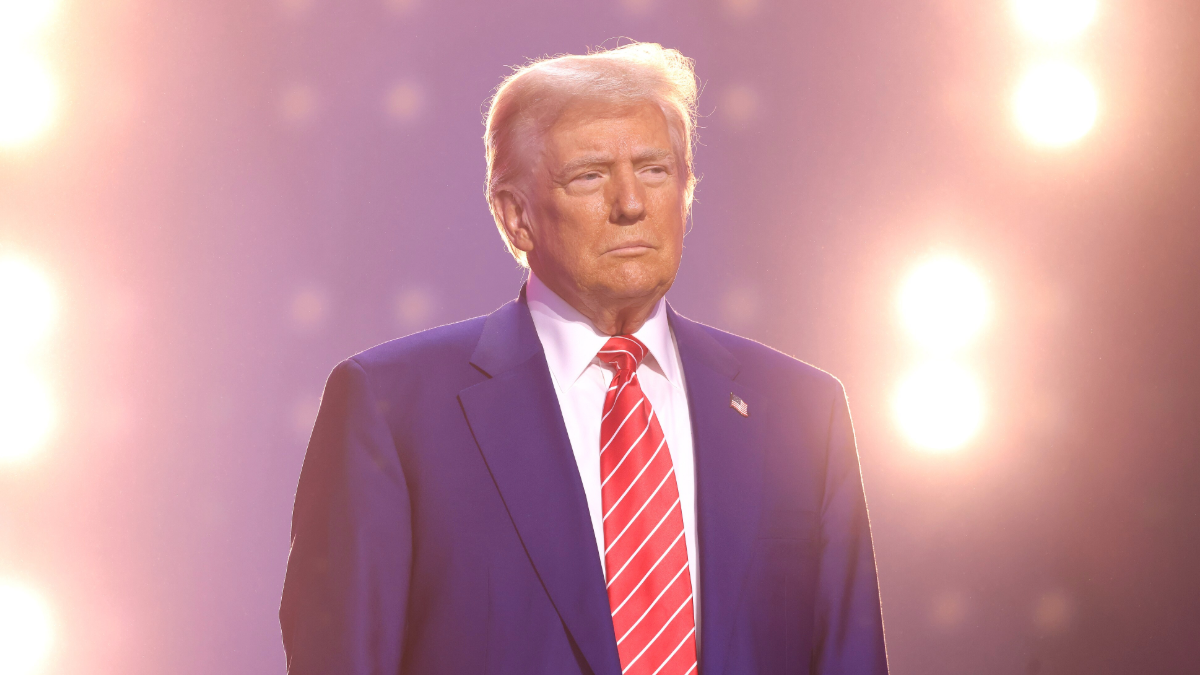What Trump’s Return Means For Encryption
Mallory Knodel / Jan 10, 2025
December 2024: US President-elect Donald Trump speaking at the 2024 AmericaFest at the Phoenix Convention Center in Phoenix, Arizona. Photo by Gage Skidmore CC BY-SA 2.0, via Wikimedia Commons.
President-elect Donald Trump’s victory in the 2024 US election was a win for Big Tech, but that doesn’t mean it’s a win for users. Tech leaders have already adapted to his transactional style and are hopeful he will ease regulations and take a softer stance on antitrust enforcement. Some predict Trump and his Republican allies in Congress might be good for privacy. But what this new dynamic means for encryption, the paradigm of privacy and security, remains uncertain.
Trump’s relationship with Big Tech has historically been rocky, with public spats and policy clashes. But as we approach the second Trump term, the tech, tech companies, and Trump have all changed. The wide democratization of AI will bring tech policy issues back like never before with a new set of concerns regarding encryption during Trump’s second term. Tech leaders are visibly relieved and lining up to reap the benefits of Trump’s more transactional approach to policymaking. A Trump administration will likely adopt a more relaxed stance on antitrust issues while scaling back regulations.
This evolving relationship has important implications for privacy and cybersecurity, and a critical technology underpinning both: encryption. Encryption protects both 1) individual freedoms and 2) national security, a key priority for the administration. But it is often at odds with law enforcement when it hinders access to data, something Trump expressed frustration with in his first term. A notable recent example: the FBI could not access some of the data on the would-be-Trump-assassin’s phone due to his use of encrypted applications. Despite this uncertainty, we can make some predictions about policies that will impact encryption and the human rights to expression, privacy, information, association, and security that it protects.
Decreased Cyber Security Regulation
President Joe Biden’s 2023 National Cyber Security Strategy emphasized stronger regulations on the private sector, particularly in mandating cybersecurity standards for critical infrastructure and holding software companies accountable for breaches. Trump, however, is likely to reject increased regulation, advocating for fewer compliance burdens on businesses. Deregulation could put corporate interests over national security, though there is bipartisan support to simplify the patchwork of existing regulations, which could lead to clearer, enforceable standards that improve cybersecurity outcomes.
This is at a time when weakened encryption would be notoriously bad for national security, as the recent Salt Typhoon attack demonstrated. Linked to China, the Salt Typhoon hacking group infiltrated US telecommunications companies and accessed sensitive data, including that of President-elect Donald Trump. This incident highlights vulnerabilities in telecom systems that should be protected by encryption but are exploited for espionage without strong safeguards. Failing to secure critical sectors with robust encryption can have widespread economic and societal consequences.
The Tension between AI and Privacy Grows
In Trump’s first term, we saw an executive order on AI aimed at US competition in the global market. Security and privacy in AI models and procurement were raised at that time, which is because AI systems require vast amounts of personal data (behavioral patterns, location, biometrics, etc.) to train and improve performance, which increases the risk of misuse and unauthorized access. Opaque AI algorithms can also exploit sensitive user information without consent, and today, unlike in 2019, we’re seeing more policy interest in how open-source AI might mitigate concerns about use.
Companies are increasingly unlikely to pick privacy over data in an AI-driven market. The importance of privacy protections to secure personal data in platforms using AI, including transparency and data governance, might be achieved with cryptographic to prevent misuse in algorithmic decision-making. But there remain central concerns that companies have to want to ensure responsible data processing by companies to protect individuals' privacy because it is unlikely that during a Trump presidency they will be required to.
AI tools can also be used to undermine encryption methods and exploit vulnerabilities – for example, by accelerating brute-force attacks. Data-hungry surveillance systems are in clear conflict with strong encryption as governments and organizations push for backdoors to access encrypted data for purposes like law enforcement, potentially making AI a catalyst for the CryptoWars 3.0.
Watered-Down Privacy Legislation
The American Privacy Rights Act (APRA), the most recent bipartisan effort to pass privacy legislation at the federal level, has little momentum and is not expected to be an immediate priority in the current Congressional session.
Republicans and Democrats are divided on two key issues. 1) Preemption, with Republicans favoring legislation that overrides existing state laws, simplifying compliance for business, and Democrats preferring to keep stricter state laws like California’s Consumer Privacy Act in place, and 2) Private Right of Action, with Democrats wanting consumers to have the right to sue for violations while Republicans are concerned about a wave of class-action lawsuits increasing costs for businesses and stifling innovation. GOP lawmakers appear to prefer regulatory enforcement through agencies like the FCC.
At the same time, fears about TikTok could have created a solid chance to push for privacy legislation, but Republicans opted instead for a bill that could lead to a ban. This was a distraction as much as it was counterproductive. Republicans narrowly focused on TikTok as a national security threat: TikTok’s data collection could allow the Chinese government to access sensitive user information despite the fact that many platforms engage in similar practices. Instead, a more comprehensive privacy law could have addressed systemic problems across all platforms, not just focused on TikTok, thus safeguarding American data from all tech companies.
More Fear, Uncertainty, and Distrust in Encryption
Elon Musk's shifting stance on encryption could significantly influence Trump's encryption policies. Previously a strong advocate for secure messaging apps, despite X’s inferior “encrypted” direct messaging, Musk has recently cast unfounded doubt about the security of Signal in particular. Given Musk's substantial influence over Trump and key conservative figures in Congress, his criticisms may sway the administration to adopt less stringent encryption standards.
Encryption is an application of cryptography that secures every user of the internet. “Crypto” tends to mean cryptography, but is arguably now more widely associated with cryptocurrency, which has Trump and his allies in headlines today. Cryptocurrency’s dubious reputation risks confusing the industry standard encryption with unregulated financial speculation, criminal activity, and poor security practices.
Astutely, Trump once called cryptocurrency a “scam.” but then he launched a new crypto platform, World Liberty Financial, run by his sons, and courted crypto donors for his 2024 election. Since then, he’s been focused heavily on speculative cryptocurrencies like Bitcoin that prioritize financial volatility and deregulation rather than supporting more stable interventions in modern financial regulation. This emphasis on speculative cryptocurrencies may divert attention from the technology that secures digital communications and protects sensitive data—potentially undermining broader cybersecurity priorities in favor of financial and political agendas.
Increase in Export Controls
Trump’s second presidency is predicted to be more trade protectionist, following digital sovereignty policy approaches taken by other democracies and emerging democracies. Like returning to protectionist trade negotiations, a Trump administration will likely continue or tighten export controls—regulations that restrict the transfer of certain technologies to foreign countries or entities—specifically on encryption technologies to safeguard national security and prevent adversaries from accessing US encryption tools. This aligns with bipartisan support for protecting advanced technologies, according to Matthew Axelrod, Assistant Secretary for Export Enforcement at the US Commerce Department.
And last but not least…
Renewed Pressure for Encryption Backdoors
The previous Trump administration pushed back against end-to-end encryption, arguing it hindered law enforcement’s ability to access messages, even with warrants. This may be a theme of his new administration as well, though it will directly conflict with issues of national security. The role Trump’s pick to run the FBI, Kash Patel, will play in this is uncertain, while he talked about rooting out “conspirators”, he has also expressed an interest in curtailing the size of the surveillance state.
An ever-closer relationship between Trump and Big Tech could reshape the future of privacy, security, and encryption in profound ways. The counterbalance of corporate tools that assure user privacy against law enforcement interests in user data is weakened by deregulation and transactional priorities, while at the same time, national security narratives against encryption are strengthened, all while individual privacy becomes increasingly precarious.
Authors
